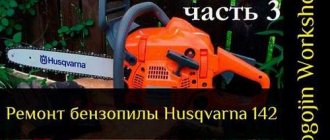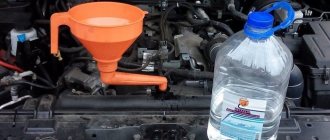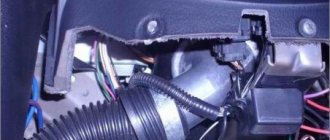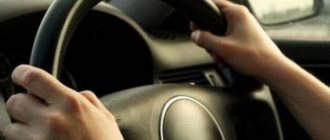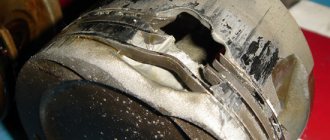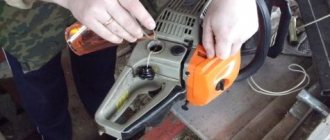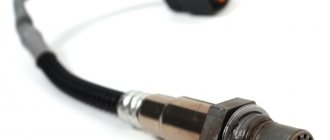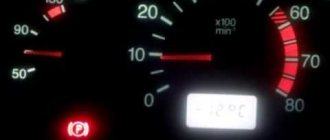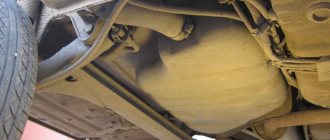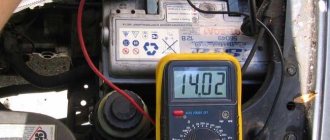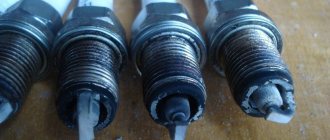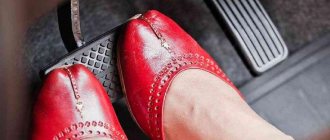Lapping
Most brake pads, even high-quality and original ones, squeak after they are replaced. The thing is that all pads contain metal, ceramic or polymer fiber.
At first, the working surface of the pads does not completely adhere to the disc, due to which extraneous sounds may appear during braking. As a rule, after 100-200 km, extraneous noise disappears, the surface of the pad rubs against the brake disc and everything falls into place.
There are also special sprays that can be used to treat the pad during replacement. Such aerosols cover the outer surface of the pad and prevent squeaking and also speed up grinding in.
If the squeak does not disappear, then this means one thing - the pads are of poor quality or simply fake.
Where does the squeak come from?
And the creaking itself is nothing more than vibration of the brake caliper, and the hollow brake disc perfectly plays the role of a resonator. Drum brake pads do not squeak as often because the braking torque on them is much less than on disc brake pads. Although they can also creak, but for a different reason. The most common culprits here are dust, moisture, dirt and pad residues that are scattered throughout the space inside the brake drum.
It turns out that there is no way to fight this disaster? Can. And manufacturers are trying their best. The main thing is to understand the nature of the squeak, and fighting it is a matter of science and technology. Some companies, for example, TRW, have offered special anti-squeak plates that are glued to the back of the pad on the caliper side. At the time of its invention, the TRW company was not yet as famous as it is today, but simply prepared sports brake pads for Formula 1 cars. After this innovation, the company increased its sales level, and the level of squeaking on the streets dropped noticeably.
Poor quality brake pads
Just 10 years ago, the vast majority of brake pads were made from asbestos. Such brake pads had a short service life, often squeaked and were harmful to the environment, so their production and use is prohibited.
In practice, there are many cheap parts manufacturers who continue to add asbestos to their brake pads. Such pads provide a short braking distance, but quickly wear out the brake disc and can produce strange sounds.
Creaking from low-quality brake pads can be eliminated by replacing them. In this case, even periodic treatment with sprays will not help.
Brake pad wear
Some brake pads (depending on the make of the car) have various types of springs installed, with the help of which they are held in place. It happens that during installation the spring may not fit correctly or bend.
At first, this does not affect the operation of the brake system in any way, but over time, when the brake pad wears out, the spring begins to touch the brake disc. The sound is very thin and loud.
It appears occasionally at first, but after a while it will be heard every time the brake pedal is pressed. Fixing the problem is quite simple - you need to remove the brake pads and install the spring correctly.
The appearance of noise when you press the brake pedal is a “bell” that is worth paying attention to
Hearing your brakes grind when you press the brake pedal is like driving at high speed on the highway with your low tire pressure light on; if you hear this, you need to stop moving as quickly as possible.
See also : Why do Porsche brakes squeak?
Braking noise that sounds like a grinding sound is usually caused by a lack of brake material on the brake pads: the pads and brake rotors rub against each other (metal-to-metal). When the brake pads are not worn out, they are covered with a special layer of friction material, which interacts with the brake disc during braking.
Naturally, the coating of the pads wears out over time, and then the metal base of the pads begins to grind the brake discs, which can damage them. So brake pads are like bars of soap that get smaller as you use them. Unfortunately, unlike soap, if we don't replace our brake pads on time, we risk leaving our car without brakes. This is why it is so important to replace your brake pads on time.
If you don't do this and the brake pads reach their limit, you must remember that every time you press the brake pedal you are killing the brake rotors. The terrible noise from worn brake pads is the voice of your car telling you, “You're killing me!” And the sooner you change the pads, the less damage you will cause to the brake system. You know, auto mechanics and car service owners have a favorite abbreviation consisting of three letters SKD: calipers, pads and discs.
Why beloved? The thing is, when you receive a bill for the work associated with this abbreviation, you will need CPR (cardiopulmonary resuscitation).
So, if you don't want to be shocked by the cost of replacing major brake system components because your old brake pads have killed your brake rotors and caused your calipers to fail, make sure to get your brake pads replaced in a timely manner.
The main rule here is this: if the brake pads are worn out, you can’t drive. In this case, call a tow truck. Yes, it's expensive. But believe me, in the long run your expenses will pay off. And it’s better, of course, not to let the pads wear out completely. Change them in advance.
Skew
Sometimes the squeaking of brake pads is due to the fact that the pad may be skewed in the caliper, and when pressed it will only touch the brake disc at one corner. Moreover, this cannot always be noticed when the brake pedal is not depressed.
There can be two reasons - the pad is installed incorrectly or there is a problem with the caliper pistons pressing it against the disc. In order to determine whether the brake pad is warped, you need to depress the brake and look at the position of the pad.
Even a slight misalignment can cause extraneous sounds. In addition, a skewed brake pad wears out very quickly and greatly wears out the brake disc.
If we don't wash, we'll ride
In addition, there is another method to combat squeaking brakes. The method that TRW suggested only works on calipers that are in good condition, but a tired caliper will still squeak. Don't change the caliper because of such nonsense. So they came up with a special anti-squeak lubricant. The company keeps its composition a huge secret, but we know that there is nothing in this mess except graphite and consistent frost-resistant and moisture-repellent, as well as high-temperature additives. Thus, when purchasing this lubricant and when replacing pads, we apply it to the back side of the pad, thereby minimizing the empty volume in the caliper, completely blocking all possible paths for the formation of extraneous noise during braking.
But this is not the last way to avoid noise. You can make a cut in the center of the block, as if dividing it into two. As a result, it turns out that the resonating plane is halved, and along with it the amount of noise decreases.
Thus, using one of these methods, you can achieve minimal noise when the brake mechanism is activated. Don't squeak your brakes, and good roads to everyone!
Foreign objects
It happens that a small pebble gets between the working surface of the pad and the disc. When you press the brake pedal, the pad is pressed against the disc, and the stone is pressed into it and gets stuck.
In the future, this manifests itself in the fact that when braking, the car may pull in one direction, and a high-pitched squeaking sound will also appear. A stuck pebble is hard to notice from the outside.
Therefore, you will have to disassemble the caliper and inspect the pads. If a foreign object is really stuck in the pad, then it is advisable to replace the pads.
The grinding noise constantly intensifies and is quite sharp.
One of the most common situations in which you will need to use the help of specialists at a service station is an increase in grinding or a sharp, strong sound of metal rubbing against metal. Most likely, the block is completely worn out; you continue to brake with the sole of the block, which is made of hard metal. If this problem is not addressed promptly, the brake disc may fail and require replacement. In this case, repairs will be three times more expensive, so it is better to immediately identify all possible malfunctions and problems that caused the grinding noise. In particular, to diagnose this problem, it is enough to carry out the following processes:
- determine from which side the grinding sound is heard, this will help you halve the amount of work required for diagnosis;
- remove the wheel that you suspect is making unpleasant sounds when braking;
- examine the exposed brake disc for grooves, chips and other problems with the working surface;
- look at the remaining layer of the brake pads, determine the degree of wear and the need for replacement;
- also examine the second wheel on this side, and best of all, examine the braking system on all wheels;
- Identify possible problems that could lead to squeaking and consult with specialists.
This will often help you determine the cause of the squealing noise when braking for free, but disassembling the brake system and performing repair work yourself is not always wise. You can use the services of specialists and guarantee the normal operation of the brake system. However, it is quite possible that all braking systems visually appear to be in good working order, but the grinding noise is still present. Then see if the car's behavior has changed during braking. If there are changes, you will have to pay more attention to this problem. If there are no changes, you can continue to operate the car until the grinding noise intensifies and gives specific clues.
Causes of squeaking brakes and methods for eliminating them
1. Atmospheric influence
The cause of squeaking brakes is often high humidity, frost and slush. Extraneous sounds can also occur while driving on dirt roads - due to dirt getting into the brake mechanism. In these situations, no repair work is necessary. After driving over rough terrain, you may only need to wash the pads.
2. Incompatibility of materials
The friction (braking) part of the pads is made of different materials that have special properties. The stiffer these materials are, the better the braking properties of the system and the longer the pads last. However, a rigid plane has a very high vibrating effect, that is, an unpleasant whistle during braking cannot be avoided. Softer pads operate silently, but wear out relatively quickly.
3. Uneven brake disc wear
Warped and uneven brake disc wear is a fairly common cause of squealing brakes. In this case, both hard and soft pads will make an unpleasant noise. There is only one way to get rid of it - by replacing the old disk with a new one. Naturally, it is possible to groove the disk, but it rarely gives positive results, and can only be done if the structure has not reached a critical degree of wear.
4. Running in new pads
It often happens that unpleasant squeaks when braking appear after replacing the pads. In this case, you just need to wait a few days until the brake pads break in. If squeaking sounds get on your nerves, you can speed up the process. To do this, you need to perform 2-3 sharp braking.
5. Pad wear
Modern brake pads are equipped with a wear indicator made in the form of an iron plate. If the system wears out significantly, the plate rubs against the brake disc, causing a squeak. In this case, you can get rid of the nasty “voice” in one way - by replacing the pads.
6. Poor quality products
In the past, when there was a shortage of spare parts for foreign cars in our country, low-quality pads from nameless manufacturers were often found on sale. Today this situation occurs less frequently. However, you shouldn't save money by buying the cheapest parts. In addition, it is wiser to look for pads not in the market, but in time-tested stores.
Poor quality pads, discs or uneven wear of elements
Brake pads and discs are consumables for a car, so car owners often purchase and replace these components on their own. Purchasing spare parts does not always happen from official suppliers; original parts are often unreasonably expensive. Therefore, we expose ourselves to certain risks by purchasing analog parts or spare parts of unknown origin. In this case, a huge set of problems is possible, which will become the main cause of problems and squeaks in the braking system:
- incorrect composition and insufficient softness of the metal in the working part of the brake pads;
- poor quality of metal in brake discs, lack of required strength and rapid wear;
- uneven wear of discs and pads, which causes ineffective braking and problems with automation;
- consumables fail too quickly, unexpected braking problems;
- poor efficiency and strong heating of discs and pads during friction, problems with the entire braking system;
- other classic problems when installing non-original equipment for your car.
Tips and tricks for novice drivers
The above list of actions should save you from further squeaks, whistles and squeals from the brake system. However, if only a temporary solution to the problem appears, simply contact the nearest car service center, where they will offer you a full diagnosis of all components of the brake system and identify the malfunction.
Remember:
- It is necessary to replace old pads with new ones after every 75-100 thousand km of the vehicle.
- Buy brake pads and rotors of the same brand and type as the original ones on the car.
- When driving on wet roads, squealing brakes are not uncommon, so dry the brakes a little first.
- To check the serviceability of the pads, perform about 5-10 gradual braking at low speeds.
- Any set of new spare parts, including the brake system, requires a certain amount of time to break in.
A harmless grinding sound - when can you ignore the sounds?
If extraneous sounds in your car are simply caused by poor quality pads, it is better to immediately change this element and not wait until the pads completely fail. But if good pads contain inclusions of harder metal, this feature is not dangerous for the discs. You can safely continue to operate the car. Only in the event of a sudden change in the behavior of the car when braking and in some cases, when the grinding noise begins to annoy with its intensity, can you consider replacing the pads and discs. Otherwise, it is enough to make sure that the nature of the sound is as follows:
- simply functional features of the working part of the pads, which contain unknown elements;
- the brake disc is not factory, which caused its rapid wear and grinding when braking;
- The grinding noise goes away after intensive pressing of the brake pedal;
- the creaking or other sound is not too annoying, it does not get louder and does not interfere with a normal trip;
- with the windows closed, you can hardly hear the squeaks of the brake system in the cabin, there is no extraneous sensation on the pedal;
- after 10-15 thousand kilometers the squeak disappears or noticeably subsides.
In other cases, it is worth paying more attention to the nature of the sound. If the grinding noise means your brake system is beginning to fail, you should take action quickly and save yourself a lot of money. If you delay the repair, you will have to change all the pads, all the discs, as well as other braking systems that may stop performing the necessary functions due to too much heating. It is also important to contact a good technician who can examine the entire braking system, conduct high-quality diagnostics and find other problems. This will allow you to return your car to normal operation. We suggest looking at information about pad wear and squeaking in the front suspension on a Chery QQ car:
The principle of operation of the car's brake system
All modern brake systems work according to the same type. The work takes place in several stages:
- When you press the brake pedal, the pressure in the hydraulic brake system begins to gradually increase;
- The increased pressure in turn causes pressure in the brake pads;
- The pads, in turn, transfer energy to the wheel housing, which then brakes the car on the road.
Thus, pressure from the driver is transferred to the caliper, which is inextricably linked to the disc. As a result, the force applied to the brakes is directly proportional to the pressure of the disc on the wheels. That is why drivers can control the braking speed with a slight movement of their feet.
At the same time, manufacturers of brake pads and discs have made sure that your vehicle always operates quietly. Let us remind you: when the brake system is activated, the disc is pressed against the base of the wheel, causing vibration. To eliminate noise during contact and prevent strong vibration of the wheel, manufacturers divide the area of the brake pads into several specific segments, each of which has a special cut along the surface. This suppresses the occurrence of squeaking and vibration.
Often, when purchasing brake pads, buyers overlook the fact that there are no slots, which can cause not only squealing from the pads even on a new car model, but also a knocking sound in the front suspension on small bumps. However, you can make slots in the pads with your own hands. To do this, adhere to the following slot parameters:
- the width of the cut should be no more than 2 mm;
- incision depth – 3.5-4 mm.
Tip: if you want to completely dampen wheel vibration when braking, round the new brake pads. To carry out this operation, contact a car service center, where they will lightly file the edges on the pads and install new brakes to replace the old ones.
However, the cause of squeaking in the brake system is rarely due to a lack of slots. We propose to consider the most common problems with brakes and effective methods for eliminating them.
Brake pads and discs
Detection of material incompatibility after purchasing pads and discs
The problem here is related to the fact that each manufacturer keeps secret the composition from which the friction (or in other words, braking) part of the surface of the pads will be made. As a result, due to the mismatch of the material, a squealing noise occurs when the pads and disc come into contact. Since manufacturers are constantly looking for a way to create the most economical pads that will combine high braking performance and guarantee durability, factories cannot come to one patented composition.
The harder the final material is, from which the friction component of the brake pads will be made in the future, the more effective the braking will be. At the same time, hard compounds will cause strong vibrations in the wheel and a sharp squeak. With softer pad compounds, the likelihood of brake squealing is reduced to a minimum, but at the same time they wear out much faster.
If the material of the set of friction linings and brake discs installed on the car is incompatible, a squeaking sound appears. Moreover, it can be heard even when driving on a straight road without using the brake. To solve this problem, simply replace the brake pads with models made by another manufacturer.
Advice: if you have replaced the timing belt on a VAZ-2109 and at the same time replaced the old pads with new ones, and the “whistle” has not stopped, then do not immediately start sounding the alarm. Manufacturers coat the surface of the brake pads with a certain spray composition, which causes squeaking in the first 5-10 km of driving. It is enough to drive the car for several days, making a couple of sharp braking on a flat road, after which the coating will be completely erased.
Squeaking caused by the surface and design of the brakes
Note that to avoid squeaking in the pads, it is best to select samples of new brakes of exactly the same shape as the old ones. A complete match in shape with the original factory pads will create reliable fastening of the models in the caliper body, which in turn will prevent unnecessary vibrations.
The design of the pad also greatly influences its performance. All modern models have a division of the friction part of the brakes into 2-3 segments. As a result, the mass and final area of the braking segments become smaller, and the frequency of vibrations increases, which makes the whistle disappear. Therefore, before purchasing new samples, check the condition of the pad and disc segments, as well as the location of the cuts. If everything is in order, then the problem does not lie in their design.
Also, the pads will stop whistling and creaking if they are given a slight rounding at the edges. Thanks to the rounded shape, the braking forces that arise when the wheels come into direct contact with the disc do not occur immediately, but gradually over time. If there is no rounding, the brakes will be applied abruptly, which will cause them to wear out quickly and whistle.
To solve problems with the design and shape of the pads, you can independently make slots in them and round them. However, manufacturers offer the option of using special anti-creaking plates. They are a 5-7 mm metal plate, which is fixed between the brake piston structure and a set of pads. Due to the even and tight fit of both structures, excess clearance is eliminated, which helps prevent vibrations and whistling.
Uneven brake disc wear
The car can also whistle when the brake discs wear unevenly or their design becomes curvature.
Worn brake disc
Advice: any set of pads will creak on “crooked” and worn brake discs.
Samples of discs are bent as a result of overheating of the structure or during water hammer (deep hole, puddle) on highly heated discs during braking. Here you can only be helped by balancing the brake discs (colloquially called grooving), and in extreme cases, replacing all wheel discs with new models.
You need to do exactly the same thing if you detect a worn wheel bearing.
Wheel bearing
All of the above problems may be accompanied by the appearance of noise due to wear of one of the parts of the brake mechanisms:
- Brake caliper guides;
- Piston;
- Racks and other components.
In such situations, vibration, accompanied by whistling and grinding, will appear even when the vehicle is moving normally on a straight road, and especially strongly when turning, even in the absence of braking.
To repair, dismantle the spare part, clean it well and lubricate it. In case of severe wear, replace the caliper and pistons with new samples.
Advice: if, when braking, the car stalls while driving along with a whistle, then you should carry out computer diagnostics of the brake and driving systems of the car.
Whistling due to weather conditions
Experienced drivers have noticed that when humidity levels increase relative to the average along with a decrease in temperature, the likelihood of hearing a whistle in the brake system is much higher than under the same conditions, but in dry sunny weather. This is due to the fact that the material from which the friction parts of the brake pads are made takes on different characteristics under conditions of changing temperature and relative air humidity.
If the car starts whistling precisely when the weather changes, then you can be sure that the whistle will disappear under normal weather conditions or after a certain number of intensive braking by the vehicle.
Tip : the hall sensor on the VAZ-2109 may also give incorrect values in bad weather. If both of these factors come together on the same day, then replacing the brake system is not required.
Also, a whistle appears when sand, dirt and dust get into the “grooves” of the pads and discs of the car. A strong whistle can cause the entry of foreign objects and brake parts that were formed during the abrasion of the braking sectors. The solution to the problem suggests itself: clean and rinse all components of the brake mechanisms, and if foreign objects are found, carefully remove them.
Let's sum it up
High-quality brake operation in a car is one of the most important features of a safe trip. If operating the machine causes certain difficulties or discomfort in terms of braking, you should immediately contact a service station and solve the problem. Otherwise, you may encounter unpleasant situations when braking turns out to be ineffective at a difficult moment and cannot provide the necessary operating features. Considering the importance of the braking system for safety, it is better not to joke with this unit and do all the work on time. Creaking and grinding noises can occur if you do not comply with the manufacturer's important car maintenance requirements.
Simply replacing your brake pads when squeaking begins can save you money, time, and keep you safe. To completely avoid trouble, it is enough to carry out the inspection on time and respond to all unpleasant manifestations. The behavior of the car, as well as the sound effects of problems, can also be an important point in diagnosing the car. Often these moments are an important harbinger of problems. What do you do if your car starts making any unnatural noises?
Communities › Lada Granta › Forum › Thumping knock in the front suspension on the right
Hello everyone) In general, for several weeks now a dull knock has been heard from the right front. It knocks when you drive slowly (up to 50 km) and there are irregularities, such as tram tracks, small bumps, joints, etc. Also, recently the same knocking noise began to appear when braking.
When you drive along the highway, everything is normal, there is nothing. I thought the steering rod was loose, but I checked everything, it was tight.
Tell me where to look, where to look, maybe someone had something similar.
Yes, this has happened, but nothing dangerous... Tighten the steering rack. At least it helped me.
Ok, I'll try, thanks)
I also had a knocking sound wherever I climbed, I overlooked the whole front and decided to put a mesh instead of a grille and took off the bumper. Well, when I put it back, everything was gone, I was surprised myself, and then I flew into all kinds of bumps and holes, I even tried it on purpose dead silence. that’s how things are.
Yes, this has happened, but nothing dangerous... Tighten the steering rack. At least it helped me.
Hello, when I turn my wheels to the left, I get some kind of dull clunking sound on uneven roads (crushed stone, gravel), but not on asphalt?!
When you come to a complete stop, does the knocking continue and then go away? I just have this problem with the right front wheel.
No, not at all when stopping and on smooth roads. Just like a rattle on bumps. What happened to your wheel?
I didn’t change anything, the sound disappeared later, but it appears rarely. I’ll figure it out at the third maintenance
When you come to a complete stop, does the knocking continue and then go away? I just have this problem with the right front wheel.
Hello. I have a dull knock that continues after stopping. Have you found the reason for yourself?
I had a similar problem, they changed the ball joint and everything became normal.
The same. Changed everything. Knocking. But not the rack.
Did you change the ball joint too and the sound didn't go away?
I mean I changed everything. I generally changed the ball joints 3 times a day...
I'll try to change the bearing and grenade. Then I'll post the result
There is also this knock. And the main thing is that it’s a scoundrel, that is, it’s not there...
It gets quieter in wet weather
Who the hell knows, I’m already sinning as a supporter too.
There is also this knock. And the main thing is that it’s a scoundrel, that is, it’s not there...
I found a knock on the front right
Yes, I found it. The ball was knocking. When the knocking started to appear more often. On the lift, the ball immediately became noticeable. I changed both and there was silence :)
Yes, I found it. The ball was knocking. When the knocking started to appear more often. On the lift, the ball immediately became noticeable. I changed both and there was silence :)
Well, and the price of the issue
The price of the issue is 1000 rubles with work. Vologda ones in my opinion. The simplest, the boot is not removable. The knock has gone away. Already drove about 9 thousand on them. I drove to the Crimea, no problems. The car drives every day.
Another question is the last wheel alignment is necessary or not?
No, after changing the ball joint, the camber does not go away. You are not changing daisies or struts. :)
Yes, I found it. The ball was knocking. When the knocking started to appear more often. On the lift, the ball immediately became noticeable. I changed both and there was silence :)
I got a knock at 26,000 from the right front, the strut is dry, nothing is leaking, but the ball joint is in the ass
At about the same mileage, I started to make a knocking noise. But these are minor things.
I got a knock at 26,000 from the right front, the strut is dry, nothing is leaking, but the ball joint is in the ass
I think I also have a ball joint))) mileage 27
Yesterday I noticed that when driving, another sound appeared in time with the rotation of the wheel. That is, it is not there. And upon arrival at the garage, when moving in reverse, some kind of clicking noise appeared. I'm going to change the grenade. Results in three hours
